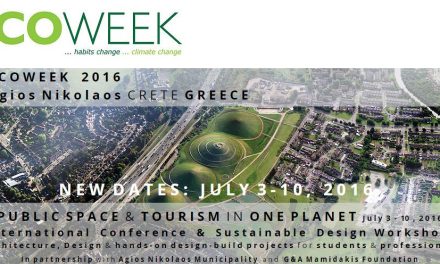What is the connection between a sunbed that generates energy from the sun or a bus stop where passengers can charge their mobile phones and a university research laboratory? The answer is Nanotechnology and the Lab for Thin Films – Nanobiomaterials – Nanosystems & Nanometrology (LTFN) of the Aristotle University of Thessaloniki. LTFN, a world-class excellence entity in various research fields with an experience of more than 25 years in Thin films Technology and the fabrication of advanced nanomaterials and nanoparticles has made a remarkable progress in transforming research into real-life products.
The Nanotechnology Lab LTFN was established in 1991 at the Physics Department of Aristotle University of Thessaloniki with the aim to promote world-class research and best-practices in Nanotechnology, Organic Electronics, Nanomedicine and Nanometrology in order to address global challenges in Manufacturing, Energy, Lighting, Electronics, Photonics, Internet of Things (IoT), Transportation, Health and Quality of Life, Agriculture, etc.
Embracing the need to connect academic research with industrial applications and the business world, the Laboratory has been operating as a Digital Innovation Hub providing open access to interested entities (Academia, Research, SMEs, Industries), while serving as a One-Stop-Shop for SMEs for technology transfer, proof-of-concept and incubation under the direction of Professor Stergios Logothetidis.
Within this scope, the LTFN has founded HOPE – A, the Hellenic Organic & Printed Electronics Association that organizes and co-ordinates the activities of industrial and research institutions in Greece in the field of Organic & Printed Electronics. The term Organic & Printed Electronics refers to a process in which printing technology is used to produce various kinds of electronic goods such as electronic circuits, displays, sensors etc. using materials constructed from organic (carbon-based) molecules or polymers. As scientists explain, this technology means that the electronics that are produced offer high mechanical flexibility and high thermal stability in low cost, compared to traditional electronics. HOPE-A counting more than 40 participating companies has signed cooperation agreements with innovation clusters from around the world, while participating as partner in research projects that aim to create innovative products that will be transferred to the market.
Printed energy applications
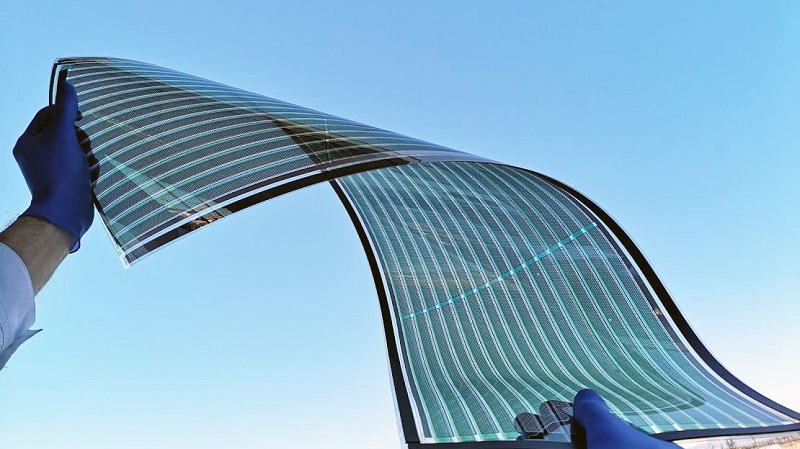
In Greece such innovative products are already being produced by the Organic Electronics Technologies (OET), a company originated at the Aristotle University of Thessaloniki, the only company in this sector in the country and one of the few in the world. The company is producing third-generation photovoltaics, organic photovoltaic (OPV) solar cells covering greenhouses and being utilized in heating and cooling systems. These photovoltaic panels are mainly intended for façades contributing to the energy efficiency of buildings, while offering design solutions as they are semitransparent and come in different colors.
Flexible solar panels can be bent and folded and as a result they can have multiple uses. OET has already produced a smart bus stop which is autonomous in energy terms thanks to the printable organic photovoltaics that cover the curved dome of the stand, producing energy from diffuse light. This smart bus stop gives passengers the opportunity to charge their mobile phone while they are waiting for their bus to arrive protecting them at the same time from the UV sun rays. The stop is also autonomously illuminated at night thanks to LED lighting, while additional services such as free Wi-Fi connection can be offered.
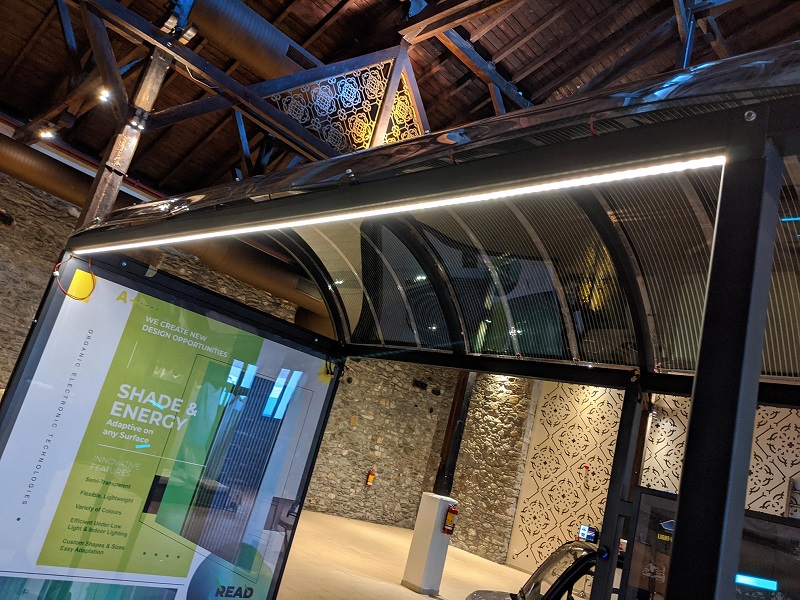
The Municipality of Neapoli-Sykies in Thessaloniki has already placed a smart bus stop using nanotechnology as part of a development program that finances and promotes the creation of smart-cities in the Greek regions limiting the emission of carbon dioxide and multiplying the social benefit for citizens.
Apart from the smart bus stop, OET has created sun loungers and sunbeds equipped with flexible photovoltaic films offering shading and energy at the same time. With built-in USB ports, users can charge their mobile phone or tablet while enjoying iced water, soft drinks or wine kept in a small refrigerator. The same recyclable nanotechnology is also used in awnings and pergolas providing simultaneously shading and green energy. OET has also fitted its third-generation photovoltaics on the roof of an electric car covering up to the 15% of the needed energy, without neglecting the application of Organic Printed Photovoltaics on clothing for warming or producing electricity.

Nanobiomed
The Laboratory of Nanotechnology has also founded a Nanomedical company, the BL Nanobiomed that has been dealing with the optimization of medical products through Nanotechnology. The aim of the company is to develop novel nanomedical technologies and products in order to overcome the clinical hurdles in the prevention, diagnosis and therapy of diseases such as nanoparticles for targeted therapeutics, antimicrobial, biosensing activities and nanofilters. After the outbreak of the COVID-19 pandemic, BL Nanobiomed created a nanofilter for advanced filtration of face masks at nanoscale that protects 99% against the coronavirus having also the ability to adapt to any type of mask. The company is also working on a cosmetic nano-formula with antioxidants for skin-regeneration purpose.
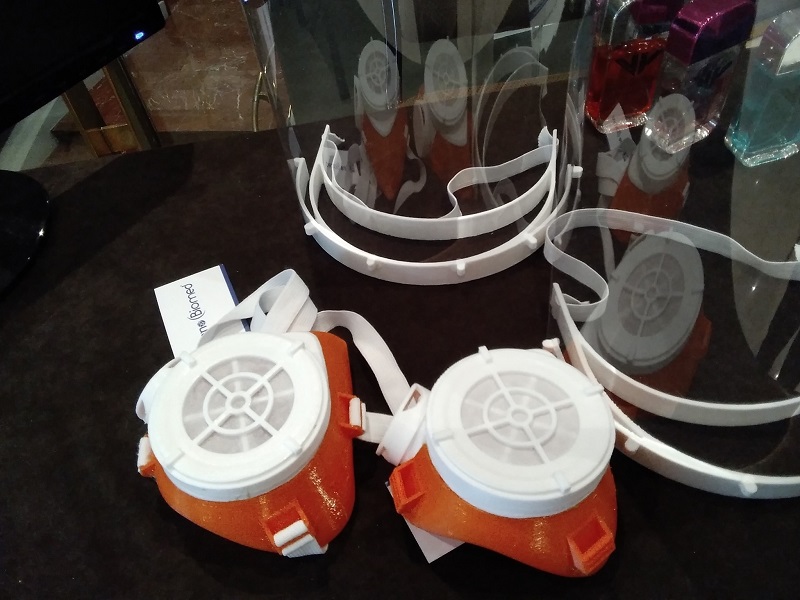
The Lab is working on a variety of applications linked to several research fields that could be summarized in the following list:
• Organic Electronics: OLEDs for displays and lighting, OPVs, OTFTs, sensors RFID
• Energy: OPVs for electricity generation, OLED lighting for energy efficiency
• Wearables: smart textiles with energy and lighting functionalities
• Buildings: energy efficient buildings, lighting, tents, roofs
• Automotive: energy generation and autonomy, solar roofs
• Agriculture: energy efficient Mediterranean Green-houses by OPVs & OLEDs
• Smart Packaging: food, consumer products, pharmaceutical products
• Nanomedicine: stents, orthopaedic implants, contact lenses, biosensors etc.
• Information Technology: Organic Electronics, Micro- electronics, Optoelectronics and Optics, Storage and Displays, Micro – fabrication
Collaborations and participation to EU programs
LTFN has developed strong collaborations with numerous education and research institutes in Europe, USA and Asia, while continues networking and partnership with key players from academia and industry worldwide. Through its participation to EU funding programs in recent years, LTFN has managed to improve its nano-production methods and more precisely to produce certain smart nanomaterials, develop smart technologies and construct suitable machines and tools. Through its state-of-the-art infrastructure and most importantly through the creation of manufacturing pilot lines the Lab is in a position to produce a series of innovative products such as printed organic photovoltaics etc.
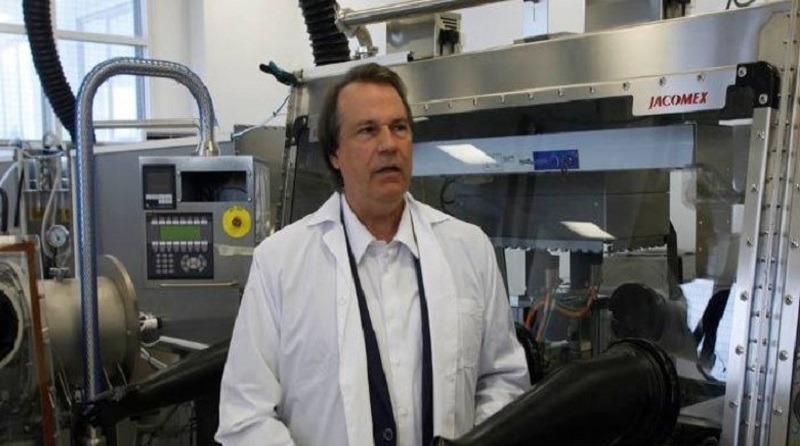
The Director of the LTFN Laboratory Professor Stergios Logothetidis
LTFN also coordinates the Research & Innovation Network Nano|Net, two Post Graduate Programs on Nanosciences and Nanotechnologies – NN, while it organizes annually the internationally established NANOTEXNOLOGY multi-event that combines International Conferences, Summer Schools and Exhibitions on Nanotechnology, Organic Electronics and Nanomedicine.
According to Professor Logothetidis the Laboratory is currently coordinating five major European research and development projects collaborating with the largest companies and research centers in the world in order to build applications mainly in the field of organic. At the same time, eight other national programs are underway involving more than 40 universities, research institutes and innovation companies. 35 researchers are currently working in the Lab that is also attracting scientists from foreign countries contributing to the reverse of “Brain Drain” to “Brain Gain”. The Lab will also participate in the Thess-INTEC mega project, the International Technology Center in Thessaloniki that is under development and aims to enhance innovative partnerships between research and industrial actors.
Photos from the LTFN website and FB page.
Read more on GNA
Big technology investments to improve Greece’s innovation and digital footprint
The Nanotechnology Boom in Thessaloniki
The Nanotechnology Boom in Thessaloniki
European Innovation Scoreboard: SMEs lead the way for innovation in Greece
I.E.
TAGS: EDUCATION | ENERGY | INNOVATION | RESEARCH | SCIENCE & TECHNOLOGY



